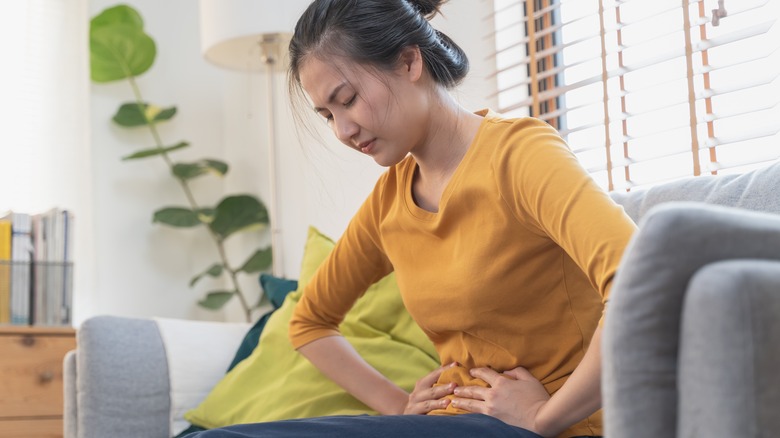Is There A Cure For Diverticulitis?
As we grow older, our bodies go through several changes that may cause health problems later down the road. For example, about one-third of people aged 50 to 59 develop small pouches called diverticula along the digestive tract, says the National Institute of Diabetes and Digestive and Kidney Diseases (NIDDK). This condition is known as diverticulosis and may not cause any symptoms. However, those tiny pockets can cause stomach pain, bloating, and other digestive symptoms, notes the MedlinePlus.
Approximately 5% of adults with diverticulosis experience an infection or inflammation of the diverticula, reports the NIDDK. In this case, we're talking about diverticulitis, a digestive disease with more severe symptoms, such as fever, vomiting, bleeding, and intestinal blockages. If left unaddressed, it can lead to abscesses, fistulas, bowel perforation, or swelling of the abdominal lining. These complications are rare, but they can happen.
Even mild cases of diverticulitis can cause pain and discomfort. The pain is usually felt in the lower or left side of your abdomen and can radiate to the back, legs, or other areas, explains the American Society of Colon and Rectal Surgeons. More severe symptoms, such as dark, cloudy urine and constipation, may be signs of complications. Diverticula can only be removed through surgery, but you can prevent them from getting worse, notes the National Health Service (NHS). Plus, it's possible to treat mild diverticulitis at home and keep it from progressing.
Diverticulitis is treatable but not curable
Diverticulitis can be mild or severe and, therefore, treatment will vary based on its symptoms. If there are no complications, your doctor may recommend a liquid diet. During a flare-up, you may consume water, tea, and clear soups, but it's best to avoid alcohol, soda, fruit juices, spicy or fatty foods, and caffeinated drinks, suggests the NHS. Note that sugar-free beverages could worsen your symptoms.
Your doctor will most likely prescribe antibiotics if the diverticula become infected. Patients who develop complications may require antibiotic treatment in a hospital setting, says the American College of Gastroenterology. In severe cases, you may need to have the pus drained or undergo surgery. The latter option is usually reserved for those with chronic diverticulitis or complications, such as colon strictures, explains the Radiological Society of North America.
Since the diverticula are permanent, they can become infected or inflamed when you least expect it. Simply put, there's no cure for diverticulitis. However, you can manage your symptoms and prevent complications by eating a high-fiber diet. The NHS recommends at least 30 grams of fiber per day, along with plenty of water. Popcorn, nuts, seeds, and other foods that were once thought to worsen diverticulitis are actually safe, according to the Canadian Society of Intestinal Research. However, they cause digestive distress in some people, says the NHS. If you're not sure what's causing your symptoms, try an elimination diet for a couple of weeks to see how your body reacts.


